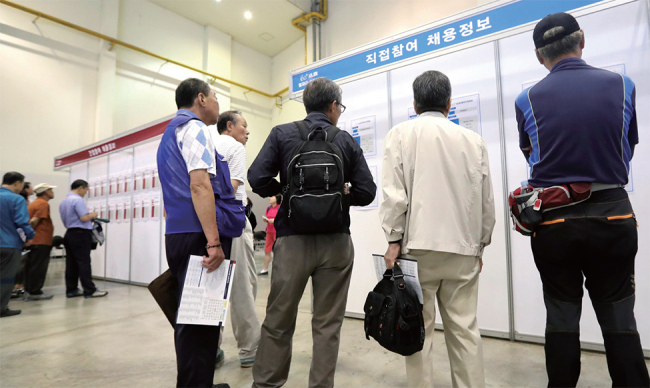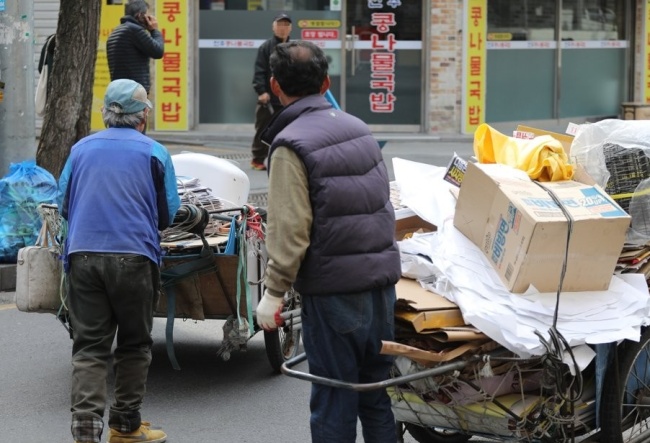South Korean seniors tighten purse strings as life expectancy rises
A new report warns aging population could drive down consumer spending
By Yim Hyun-suPublished : Oct. 29, 2018 - 09:28
A growing number of seniors in South Korea are spending less than before, as the focus is shifting toward savings in preparation for a longer retirement.
According to a new government report released by the National Assembly Budget Office on Sunday, South Korean elders are spending considerably less of their incomes than their American and Japanese counterparts.
The average propensity to consume, which measures the income spent on goods and services, stood at 67.2 percent in 2016, the economic outlook report for 2019 and the following years showed.
According to a new government report released by the National Assembly Budget Office on Sunday, South Korean elders are spending considerably less of their incomes than their American and Japanese counterparts.
The average propensity to consume, which measures the income spent on goods and services, stood at 67.2 percent in 2016, the economic outlook report for 2019 and the following years showed.

The figure pales in comparison to American counterparts aged over 65, whose APC was at 104 percent. Elderly South Koreans are more financially strained than the same age groups in Japan also, whose figure stood at 88.6 percent.
The report also predicted that the downward trend in consumer spending will continue as baby boomers in the country enter the aging population.
The longer life expectancy means more economically active people are preparing for life as senior citizens through economic activities such as saving, which could cause a decline in propensity to consume in the country.
The prediction is bucking the usual trend, in which over-60s spend relatively freely after focusing on saving through their 40s and 50s.
The country’s fast growing life expectancy is accelerating the trend.
According to the Organization for Economic Cooperation and Development, the life expectancy for South Koreans rose from 70.4 to 82.8 years, growing at the second-fastest pace among OCED member states after Turkey.

In a further sign of senior citizens being more financially apprehensive, the report also revealed more South Koreans aged over 60 are going back to work, with the employment to population ratio among them growing from 49 to 55.2 percent between 2009 and 2018.
The figures are further backed by Statistics Korea’s data from September, which showed that over 33 percent of South Koreans aged between 70 and 74 were in employment, a far cry from the average figure of 15.2 percent among OCED member states.
The report had some positive outlooks as the government is expected to increase the budget for health, welfare and employment by an annual increase of 10.3 percent over the next four years.
By Yim Hyun-su (hyunsu@heraldcorp.com)







![[Graphic News] More Koreans say they plan long-distance trips this year](http://res.heraldm.com/phpwas/restmb_idxmake.php?idx=644&simg=/content/image/2024/04/17/20240417050828_0.gif&u=)
![[KH Explains] Hyundai's full hybrid edge to pay off amid slow transition to pure EVs](http://res.heraldm.com/phpwas/restmb_idxmake.php?idx=644&simg=/content/image/2024/04/18/20240418050645_0.jpg&u=20240419100350)





![[From the Scene] Monks, Buddhists hail return of remains of Buddhas](http://res.heraldm.com/phpwas/restmb_idxmake.php?idx=652&simg=/content/image/2024/04/19/20240419050617_0.jpg&u=20240419175937)

![[KH Explains] Hyundai's full hybrid edge to pay off amid slow transition to pure EVs](http://res.heraldm.com/phpwas/restmb_idxmake.php?idx=652&simg=/content/image/2024/04/18/20240418050645_0.jpg&u=20240419100350)

![[Today’s K-pop] Illit drops debut single remix](http://res.heraldm.com/phpwas/restmb_idxmake.php?idx=642&simg=/content/image/2024/04/19/20240419050612_0.jpg&u=)